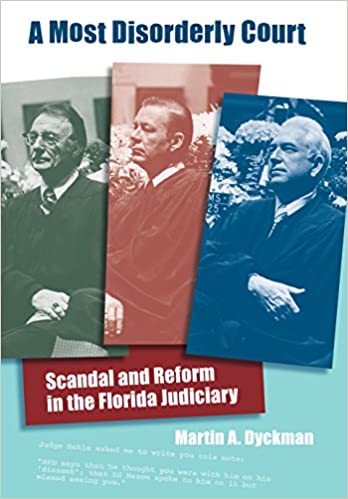 |
|
 |
|
 |
 |
 |
 |
 |
 |
 |
 |
 |
 |
| 2020 Election: | Joe Biden's book | Cory Booker's book | Pete Buttigieg's book | Kamala Harris' book | Bernie Sanders' book | Donald Trump's book | 2018 Senate Debates |
A Most Disorderly Court Scandal and Reform in the Florida Judiciary by Martin Dyckman  (Click for Amazon book review)
BOOK REVIEW by OnTheIssues.org:
A Most Disorderly Court: Scandal and Reform in the Florida Judiciary, by Martin A. Dyckman is a 2008 entry in the Florida History and Culture Series from the University Press of Florida. Its primary concern is the Florida Supreme Court, particularly in the 1970s, when it was rocked by scandals that led to resignations, impeachments, and criminal trials. While that necessarily limits the audience for such a book, it does have some notes that resonate in the present day and not just for Florida. A major theme is how much politics played--and continues to play--in who gets to be a judge. In Florida some judicial positions are filled at the ballot box and others by appointment. Dyckman points out that in 2005 nearly 80% of appointed judges were Republicans when, at the time, party registration was less than half of that. In recent years we've seen this replicated at the Federal level, perhaps most notoriously when Senate Republicans refused to even hold hearings on Merrick Garland, appointed to the Supreme Court by President Barack Obama on the specious grounds that it was "too close" to a presidential election that was months away. They had no such objection in rushing through the nomination of Amy Coney Barrett literally weeks before the 2020 election. Of equal interest is Dyckman's thesis as to why Florida was ripe for reform in the 1970s. Under voting rights decisions of the U.S. Supreme Court, the state was now required to create legislative districts of equal size which greatly shifted the balance of power. Prior to the change, he reports, rural counties with 12% of the population could elect a majority of the state Senate, and with 18.8% of the population could control the state House. That is reflected in the current national debate over how U.S. Senators representing about one-third of the country can prevent the Senate from taking any action through the filibuster. Likewise, the Electoral College gives rural states disproportionate power so that, for example, in 2016 Hillary Clinton could win the popular vote and still lose the presidency to Donald Trump. Of course, Florida is a different state today with recent governors Jeb Bush and Rick Scott and incumbent Ron DeSantis showing little interest in non-partisan reforms. Bush, sometimes thought to be more moderate than his successors, is quoted as not really believing in co-equal branches of government, "The increasing power of the courts in our society should not come at the expense of institutions that have a more legitimate claim to govern our lives." [p. 163] While this volume is primarily a study of a narrow slice of Florida history, it is also warning looking forward. As writer and philosopher George Santayana put it, "Those who cannot remember the past are condemned to repeat it." -- Daniel M. Kimmel, April 13, 2022
Scandal and Reform in the Florida Judiciary by Martin Dyckman.
| |||||||||||||||||||||||||||||||||||
| |||||||||||||||||||||||||||||||||||
Page last edited: Nov 25, 2021